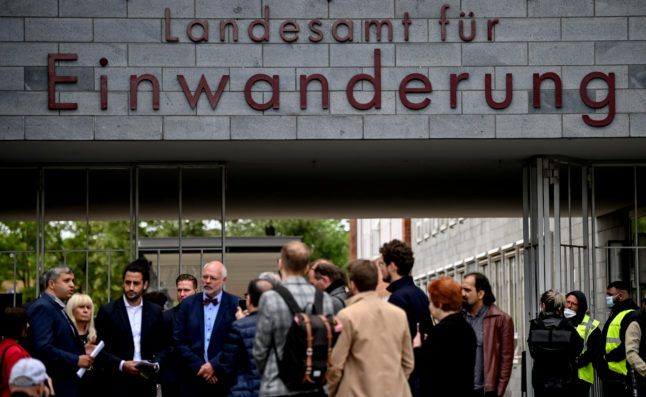What’s happening?
The business-friendly FDP, which is part of the ruling coalition along with the Social Democrats (SPD) and the Greens, laid out plans this week on how they think Germany could become more immigration friendly to attract skilled workers.
“We see the economic and social challenges and that is why our country must have enough skilled workers to face these challenges,” said Education Minister Bettina Stark-Watzinger, who is also an FDP Executive Committee member.
“There is a lack of IT workers, there is a lack of ‘techies’. But there is also a shortage of care workers and a shortage of truck drivers. We are talking about a whole range here.
“So we have to fundamentally address immigration law.”
READ ALSO: Germany must remove hurdles for foreign skilled workers, says minister
As part of their proposals, the FDP said English should be introduced as an additional administrative language among German authorities.
Many people who come to Germany from abroad struggle when attending official appointments at places like the Ausländerbehörde (immigration office) because – in the vast majority of times – the only language spoken is German. People are required to bring a translator with them to appointments if they can’t speak German well enough.

The proposal from the FDP is part of a 10-point programme to facilitate the immigration of skilled workers, which the party presented in Berlin on Monday. The Liberals want to use the plan to push for a reform of immigration law in the coalition government.
A lack of German language skills is “a very big hurdle” in recruiting urgently needed skilled workers, said Stark-Watzinger.
The minister proposed that Germany “introduce English as a second language in administration so that those who come to us can access it”.
Stark-Watzinger said that having all staff in authorities – known as Behörden in Germany – speak fluent English could not be implemented immediately. But it’s about “making the initial start”, she said.
Officials who already speak English could be specifically deployed to assist people from abroad, the minister said. For others, there could be opportunities for language training.
“The signal must be: we are a country of immigration,” said Stark-Watzinger. “We want that. We want diversity.”

Germany is ‘country of immigration’
In the position paper, the FDP called for a fundamental overhaul of immigration policy to combat the shortage of skilled workers in many economic sectors.
“Labour and innovation from abroad will be indispensable for our country to successfully grow out of the current crises and to permanently meet the needs of our labour market,” it said.
“As a country of immigration, Germany is in a global competition for qualified workers, whom we urgently need in view of our demographic development and to secure our prosperity – especially with a view to the stability of our social systems, in particular the pension system.”
This makes it all the more important to shape immigration “not in a short-sighted and ideological way, but with foresight and realism”.
The party estimates the need for immigration into the German labour market at more than 400,000 people per year – and that will likely increase.
To make this possible, the existing European Blue Card scheme for the immigration of skilled workers should be expanded to include non-academic professions, the party proposes.
Furthermore, there should be a “Chancenkarte” or opportunity card to facilitate access to the German labour market for foreign workers on the basis of a points system.
The FDP’s Johannes Vogel, who also worked on the plan, tweeted: “A modern immigration policy with a real points system based on the Canadian model, better Blue Card, English as a second official language in contact with skilled workers, faster visas and recognition of degrees and more.”
READ ALSO: What Germany’s plans for a points-based system means for foreigners
Eine moderne Einwanderungspolitik mit echtem Punktesystem nach Vorbild 🇨🇦, besserer Blue Card, Englisch als zweiter Amtssprache im Kontakt mit Fachkräften, schneller werden bei Visa & Anerkennung von Abschlüssen & mehr – Ideen von @starkwatzinger & mir 👇🏻https://t.co/lmhJa95rKw
— Johannes Vogel (@johannesvogel) July 4, 2022
Get rid of hurdles
The FDP also says that more should be done to get rid of hurdles for people coming from abroad.
Simpler recognition of foreign educational and professional qualifications is a “special priority”, according to the party. Visa procedures are to be accelerated and digitalised to a greater extent, too.
“Our message to skilled workers abroad must be that controlled immigration to our country is desired and welcome,” the proposal states.
The party also wants to see that the reform of German citizenship laws, which would allow non-EU nationals to hold more than one nationality, “be tackled quickly”.
READ ALSO: INTERVIEW: Changing German citizenship laws is a priority’
Here’s a summary of the most important points:
- Further development of immigration law, including the introduction of an ‘opportunity card’ based on a points system
- Digitise the issuing of visas
- Remove obstacles for the recognition of professional and educational qualifications and extend the Blue Card to non-academic professions
- Facilitate the transition from the asylum procedure to regular immigration into the labour market
- Reduce bureaucracy in labour migration and improve networking between authorities
- Enable transnational labour migration in practice
- Promote immigration opportunities to Germany locally
- Establish English as an additional administrative language
- Modernise citizenship law
- Coherent immigration law from a single source
In the resolution, the FDP also welcomes steps already taken by the coalition “to make working in Germany much more attractive for talented people from abroad”, such as the Skilled Workers Immigration Act, which was passed by the previous government,
The party also commends the facilitation of family reunification and the planned right of residence for people with long-term ‘tolerated stay’ permits.
Stark-Watzinger said skilled workers are in demand internationally. “We (Germany) are in competition with other countries, so the hurdles to come to us must be very low,” she said.
READ ALSO: ‘I finally feel at home’: How Germany’s planned changes to citizenship laws affect foreigners
As The Local has been reporting, German government ministers are easing red tape so that private companies can employ foreign workers during the current aviation staffing crisis that is causing disruption for travellers.
Ministers are also looking at how they can use this strategy in other sectors that are worker-starved, including hospitality.
READ ALSO: Germany looks to foreign workers to ease ‘dramatic’ worker shortage
Other politicians are also pushing for change. Brandenburg’s state premier Dietmar Woidke (SPD) said he also saw a need for action.
“A lack of skilled workers is the greatest risk to good economic development throughout Germany,” Woidke told the Handelsblatt.
Woidke said the current immigration law was “no longer up to date”. But he said the government was currently working on improving the right of residence to allow well-integrated foreigners the right to stay. “I welcome these plans, from which Brandenburg will then also benefit,” said the head of government.




 Please whitelist us to continue reading.
Please whitelist us to continue reading.
If Germany is serious about immigration and being economically competitive then it really does need to lower the barriers to gaining, not just dual citizenship, but citizenship per se. For example: demanding a language level of B1 is not necessary when the world speaks English